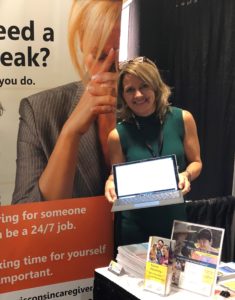Thankful for SNAP: #HandsOff
This was part of a series called #HandsOff, where we featured calls to action and stories from families across The Arc’s network about how key policy issues impact their day-to-day lives.
Written by: Anne Clinard Barnhill, Sister to an Autistic Adult
 My sister, Rebecca, is sixty years old and one of the most amazing and resilient women I have ever met. When she was born in 1958, autism was barely whispered among doctors. The general public knew nothing about the condition. Becky wasn’t officially diagnosed with autism until she was thirty-seven years old.
My sister, Rebecca, is sixty years old and one of the most amazing and resilient women I have ever met. When she was born in 1958, autism was barely whispered among doctors. The general public knew nothing about the condition. Becky wasn’t officially diagnosed with autism until she was thirty-seven years old.
She is living life as fully as possible. She shops, goes to the Senior Center for exercise two or three times a week, goes to Weight Watchers, and continues to hone her independent living skills. Several years ago, she participated in a program called Beyond Academics at the University of North Carolina. Innovative and person-centered, this four-year program allowed Becky to attend classes on campus, just like traditional college students — only she studied self-care, cooking, budgeting, and other independent living skills.
After graduation, she made the choice to live independently with a roommate. They split the rent and utilities, but food is purchased on an individual basis. Becky blossomed in the independent living situation. She made friends and learned her way around Wilmington. She cannot yet use public transportation, but that is one of her goals. She has procured a part-time seasonal job, which she loves. She works one afternoon per week from Memorial Day through Labor Day.
One thing that makes this life possible for her is the Supplemental Nutrition Assistance Program (SNAP). Millions of people with disabilities, like Becky, rely on SNAP to access the food they need. Last week, SNAP helped Becky prepare for Thanksgiving as she was able to gather the ingredients she needed to prepare a tasty meal, with help from family and friends. Support from SNAP helps her to purchase to healthier foods like fresh fruits and vegetables. As a breast cancer survivor, she needs to eat a lot of fresh food to help keep a recurrence from happening. She makes wise choices with her SNAP food monies and this helps keep her healthy. If SNAP were taken away, she would be forced to purchase cheap processed foods and would rarely afford fresh produce.
SNAP enables Becky to continue living independently. She is happier, healthier, and SNAP helps make it all possible. I beg Congress to protect the SNAP program.
Becky has the courage of a lion and the heart of tiger. She has braved many situations with dignity and such gumption. She needs a little help from her friends — don’t we all? SNAP is her friend and I pray she continues to receive this, as without SNAP, her whole life — the life she has built brick by brick — will be at risk of tumbling down.




 Each November, we observe National Caregiver Month – honoring those who devote their lives to providing care for individuals with intellectual and developmental disabilities.
Each November, we observe National Caregiver Month – honoring those who devote their lives to providing care for individuals with intellectual and developmental disabilities. 





